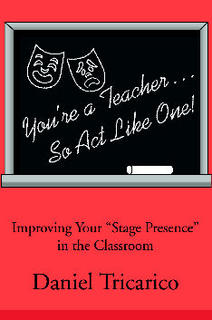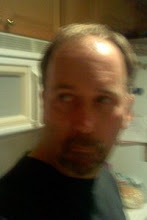
Just after getting married, I decided that if I was seriously going to be a writer, I needed to write a full-length book. I was a drama major in college and had become an English teacher and had always said that teaching was like doing five shows a day: there was a performer (teacher), a stage (classroom), an audience (students) and, usually, a script (lesson plan). I'd thought about running workshops that taught teachers how to use the performance techniques that actors use to be better presenters in the classroom, but ultimately I decided just to write it as a book. I really wanted to write a novel, but that was too daunting (my previous attempt was a narrative non-fiction manuscript about my first year of teaching called
Confessions of a Rookie Teacher. That book was simply an exercise in practicing scene structure and seeing how much I could write. It is currently residing, justifiably, in a trunk in my garage).
In a year or so I had cranked out thirty three essays on how to use costumes, character voices, lighting, and mulit-media in the classroom. There were also entries on acting techniques like concentration, physical and vocal warm-ups, and trust. At the end, I was pleased with the result. A colleague in the English department read and critiqued it, and then I was set to start sending it out.
That's where the real education began.
I had to create a non-fiction book proposal including a cover letter, chapter outline, market analysis of existing books on the same theme, author bio, and sample chapters. It was a ton of work and not nearly as fun as writing the book itself. Eventually, I finished and began sending it out.
After it was rejected by four literary agencies (form letters kept saying things like "innovative project," "well-written," "interesting"), I was ready to send it out again when my neighbor told me she heard about a way writers could their books published.
After years of fielding all kinds of suggestions, most of which involved vanity presses where you paid seventy-five to a hundred dollars for a book with your poem in 8 point font and that only you and your family members would see (if they paid, too), I was politely reluctant to hear what she had to say. But she gave me a creative arts trade journal with an article all about iUniverse, a print-on-demand company that was half-owned by Barnes & Noble. I read the article, looked at their website, researched their printed books at my local Barnes & Noble, and requested their information packet.
I kept looking for the catch, but I couldn't find one. Sure, I had to do all the marketing, but the books had good production value, would be listed in Books in Print, Amazon.com, and Barnes & Noble website, and all for $99 (at the time; now it's about $499). I realized that this was the way I should go with my teaching book. I did one more draft of
You're a Teacher. . .So Act Like One! Improving Your Stage Presence in the Classroom.First, though, to test the print-on-demand waters (and pursue another life time dream),
I wrote a book of poetry for my wife (
Thawing the Glacier) and sent it in to iUniverse. The day the book came in the mail--my first published book!--I was shaking and could barely open the package. An entire published book, written by ME. It was almost too much to comprehend.
I gave the poetry book to my wife for Christmas and her aunt bought five or six copies. A few friends bought another two or three and I bought another copy for myself. To this day, those are the only copies of that book that have been sold.
Pleased with my print-on-demand experience, I sent off the teaching book, and although they had raised their prices to $159 by then, I still thought it was a bargain. The book would be marketed to teachers around the nation and my only real goal was to recoup my initial investment and say I was "author of. . ."
The book looked great when it came out and exceeded my expectations. A colleague of mine from school who had moved on to teaching the teacher candidates in the UCSD education program asked me to give two presentations to his classes based on the book. He paid me $100 and I sold a book or two on those nights.
Due to family obligations, health issues, and my reignited desire to write fiction, I didn't spend a lot of time marketing
You're A Teacher. . .So Act Like One! I see it now as a grand experiment. I learned a lot about the publishing business, learned I can write a competent book length manuscript, and learned that the little black notebook I bought to keep track of all the income from the teaching book was a waste of two dollars. National University's teacher ed program has thought--off and on--about using it as a textbook (at least in San Diego) and I could pursue other avenues of marketing for the book, but I really switched gears back into fiction and have to budget my writing/marketing time.
I felt I needed to focus on what I most wanted from my writing.
In short, the teaching book died on the vine. And while part of that is disappointing, I know it's where I should be right now.
After all, I have a mystery novel to sell.
Labels: history, writing practice, You're a Teacher


